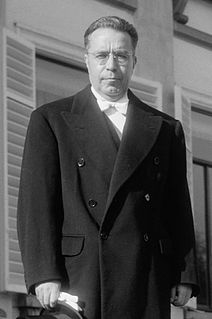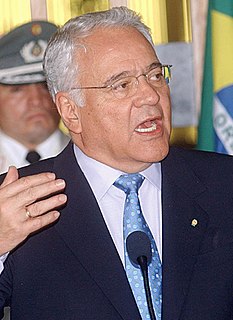
The politics of Bolivia takes place in a framework of a presidential representative democratic republic, whereby the president is head of state, head of government and head of a diverse multi-party system. Executive power is exercised by the government. Legislative power is vested in both the government and the two chambers of parliament. Both the Judiciary and the electoral branch are independent of the executive and the legislature. After the 2014 election, 53.1% of the seats in national parliament were held by women, a higher proportion of women than that of the population.

The Revolutionary Nationalist Movement is a Bolivian political party and the leading force behind the Bolivian National Revolution. It influenced much of the country's history since 1941.

Danilo Medina Sánchez is a Dominican politician and the current President of the Dominican Republic, since 2012.

Ángel Víctor Paz Estenssoro was a Bolivian politician who served as President of Bolivia from 1952 to 1956, 1960 to 1964 and 1985 to 1989. He ran for president eight times and was victorious in 1951, 1960, 1964 and 1985. His 1951 victory was annulled by a military junta led by Hugo Ballivián, and his 1964 victory was interrupted by the 1964 Bolivian coup d'état.

Elections in Bolivia gives information on elections and election results in Bolivia.
David "Dave" MacKenzie is a Canadian politician. He is a current member of the House of Commons of Canada, representing the riding of Oxford, Ontario as a Conservative.

Nationalist Democratic Action is a right-wing political party in Bolivia led by Oscar Daza Márquez. ADN was founded on March 23, 1979 by the military dictator Hugo Banzer after he stepped down from power. It later expanded to include the Revolutionary Left Party (PIR) and a faction of the Bolivian Socialist Falange (FSB). As leader of the ADN, Banzer ran in the 1979, 1980, 1985, 1989, 1993, and 1997 presidential elections. He obtained third place in 1979 and 1980, and won a plurality of the 1985 vote, but, since he did not attain the 50% necessary for direct election, Congress selected the chief executive. Its choice was the second-place finisher, Dr. Víctor Paz Estenssoro.

José Enrique Hertzog Garaizábal was a Bolivian politician who was elected President of his country in 1947. He resigned in 1949.

Wálter Guevara Arze was a Bolivian statesman, cabinet minister, writer, diplomat, and president (1979).

A vote of confidence in President Evo Morales in the form of a referendum was held in Bolivia on 10 August 2008. The vote was held to determine whether Morales, Vice President Álvaro García Linera, and eight out of nine departmental Prefects should stay in office. Morales received more than 67% support and six of the eight prefects were returned. The prefects of Cochabamba Department and La Paz Department were defeated and had to face re-election.

General elections were held in Bolivia on 30 June 2002. As no candidate for the presidency received over 50% of the vote, the National Congress was required to elect a President. Gonzalo Sánchez de Lozada was elected with 84 votes to the 43 received by Evo Morales.
The history of Bolivia since 1982 begins with the restorations of democracy after the rule of the military junta of 1982. Evo Morales has held the presidency since 2006. A new constitution was enacted in 2009. Bolivia's population has roughly doubled over this period, from 5 million in 1980 to 10 million as of 2012.
Popular Consensus was a Bolivian political party founded in 2009. CP founder Óscar Ortiz Antelo was President of the Senate of Bolivia from 2008 to 2010. In the 2009 national election, the party formed an electoral alliance with the National Unity Front, the Consensus Alliance for National Unity, behind the candidacy of Samuel Doria Medina for President. During the 2010 regional election it was involved with the All for Cochabamba and We are all Chuquisaca alliances, and supported the candidacy of Rubén Costas for governor of Santa Cruz. In Pando, the party narrowly lost to the Movement towards Socialism in state elections, and thus formed the principal opposition. CP was replaced by the Social Democrat Movement ("Demócratas") in August 2013.

General elections were held in Bolivia on 12 October 2014, the second to take place under the country's 2009 constitution, and the first supervised by the Plurinational Electoral Organ, a newly created fourth branch of government. Incumbent President Evo Morales was re-elected for a third term.
Alejandro Pereyra Doria Medina is a Bolivian poet and filmmaker. He was born in Sucre, Bolivia, lived in Mexico, Brazil and Germany for many years, and now lives in Bolivia. His 2009 feature film Verse was selected for the 2010 Zero Latitude Film Festival Ecuador and the 2011 Festival Del Cinema Latino Americano Trieste.

The Movement for National Rectification–Unionist is a political party in Gabon.
Ana María Flores Sanzetenea is a Bolivian engineer, businesswoman, ex-senator, and politician. She is also known for her candidacy for the presidency of Bolivia in the 2009 general election, in which she finished fifth.
Arthur Emmanuel Bandara Kiriella was a Ceylonese politician.













